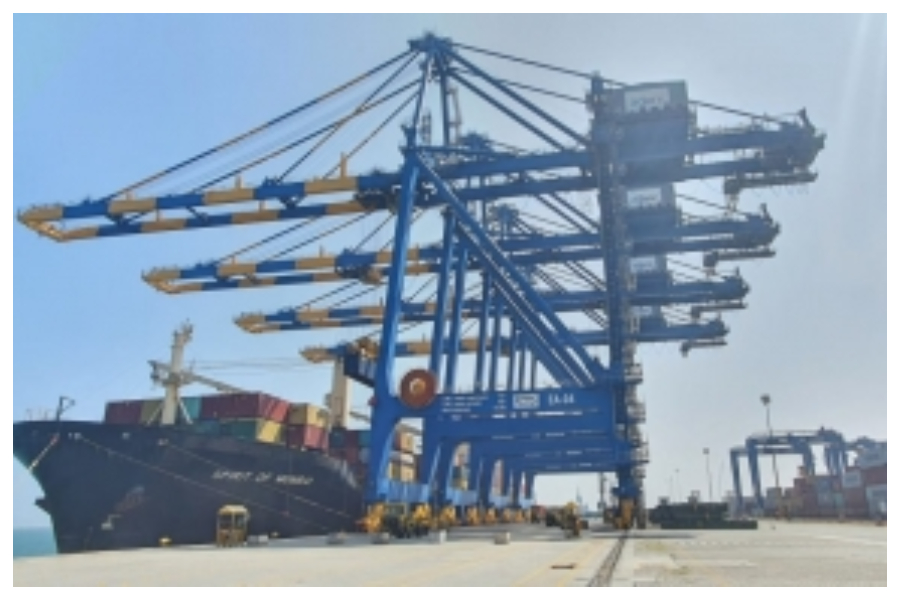Business
Adani acquires India’s largest marine services company Ocean Sparkle

Adani Ports and Special Economic Zone Ltd (APSEZ) through its subsidiary, The Adani Harbour Services Ltd (TAHSL), has entered into a definitive agreement for acquisition of 100 per cent stake in Ocean Sparkle Ltd (OSL), India’s leading third-party marine services provider.
Key activities carried by the company include towage, pilotage, and dredging. With an asset base of 94 owned vessels and 13 third-party owned vessels, OSL is a market leader. OSL is valued at an enterprise value of Rs 1,700 crore with Rs 300 crore of free cash in the company. The company was established in 1995 by a group of marine technocrats with P. Jairaj Kumar as the Chairman and MD, who will continue as the Chairman of the OSL board.
“Given the synergies of OSL and Adani Harbour Services, the consolidated business is likely to double in five years with improved margins, thereby creating significant value for APSEZ’s shareholders,” said Karan Adani, CEO and Whole-time Director, APSEZ. “This acquisition not only provides APSEZ a significant share of India’s marine services market but also provides us a platform for building presence in other countries, thereby facilitating APSEZ’s journey towards becoming the largest port operator globally by 2030 and largest integrated transport utility in India.”
OSL has long-standing relationships with its existing clients, with contracts ranging from 5 to 20 years (average length of contracts is 7 years). Further, the contracts are on Take or Pay (TOPA) basis, thereby providing robustness to OSL’s business model. The Company has presence in all the major ports, 15 minor ports and all the 3 LNG terminals in India.
Over the years, OSL has built and deployed a team of 1,800 personnel across India. The Company has significant experience in global maritime servicing through its operations in Oman, Saudi Arabia, Sri Lanka, Qatar, Yemen and Africa.
OSL’s attractive capital structure, quality operations and sustainable cash flows are reflected in its attractive credit rating (AA- by ICRA). The Company is expected to have revenue of INR Rs 600 crore, EBITDA of Rs 310 crore and PAT of Rs 135 crore in FY22. Around 92 per cent of OSL’s total revenue was contributed by marine services (Towage & Pilotage), and the remaining 8 per cent is from dredging and other offshore services combined. The net debt to EBITDA ratio is less than 1x. APSEZ’s acquisition of OSL concluded at an attractive EV/ FY23E EBITDA of 5.7x.
On the back of operational and financial synergies, the consolidated revenue and EBITDA of Adani Harbour Services is expected to jump ~100 per cent and reach around Rs 5,000 crore and Rs 4,000 crore respectively by FY27.
Business
India-New Zealand FTA: PM Modi, Luxon aim to double bilateral trade over 5 years

New Delhi, Dec 22: Prime Minister Narendra Modi held a telephone conversation with New Zealand’s Prime Minister, Christopher Luxon, on Monday as the two leaders jointly announced the successful conclusion of the historic, ambitious and mutually beneficial India-New Zealand Free Trade Agreement (FTA).
During the conversation, both leaders expressed confidence in doubling bilateral trade over the next five years as well as an investment of $20 billion in India from New Zealand over the next 15 years.
The negotiations began in March this year and the two leaders concluded the FTA in a record time of nine months, reflecting the shared ambition and political will to further deepen ties between the two countries, according to a statement from Prime Minister’s Office (PMO).
“The FTA would significantly deepen bilateral economic engagement, enhance market access, promote investment flows, strengthen strategic cooperation between the two countries, and also open up new opportunities for innovators, entrepreneurs, farmers, MSMEs, students and youth of both countries across various sectors,” said the statement.
The leaders also welcomed the progress achieved in other areas of bilateral cooperation such as sports, education, and people-to-people ties, and reaffirmed their commitment towards further strengthening of the India-New Zealand partnership.
This historic FTA eliminates and reduces tariffs on 95 per cent of New Zealand’s exports – among the highest of any Indian FTA – with almost 57 per cent being duty-free from day one, increasing to 82 per cent when fully implemented, with the remaining 13 per cent subject to sharp tariff cuts.
It puts New Zealand exporters on an equal or better footing to our competitors across a range of sectors and opens the door to India’s rapidly expanding middle class, according to an official statement from New Zealand.
“The Indian economy is forecast to grow to NZ$12 trillion by 2030. The India-NZ Free Trade Agreement unleashes huge potential for our world-class exporters to the world’s largest country and will significantly accelerate progress towards New Zealand’s ambitious goal of doubling the value of exports over 10 years,” it added.
Business
Mumbai-Bound Air India Flight Returns To Delhi Airport Minutes After Take Off Due To Technical Glitch

New Delhi: A Mumbai-bound Air India flight AI887 returned to the Delhi Airport minutes after take-off due to a technical issue. The Delhi–Mumbai flight made an emergency landing according to standard operating procedure.
As perv an Air India spokesperson, the aircraft (Boeing 777) landed safely at Delhi, and the passengers and crew disembarked.
The Boeing 777 suffered an engine issue soon after take-off, reported The Times of India. The aircraft reportedly took off at 6.10 am and returned to the airport at 6.52 am. The aircraft is currently undergoing necessary checks.
As per the report, the airline arranged another B777 (VT-ALP) for passengers and even provided refreshments for them.
On Sunday, over 100 flights were cancelled from the Delhi Airport due to dense fog conditions in the national capital. Meanwhile, more than 400 flights were also delayed at the airport.
Over the past few days, most parts of the nothern and northwestern regions of the country are witnessing dense fog condition.
“Dense to very dense fog conditions during night/morning hours very likely in some parts of Uttarakhand, Uttar Pradesh, Haryana till morning hours of 21st; in isolated pockets of Punjab, Haryana during 25th-27,” the India Meteorological Department (IMD) had said in its press statement on Sunday.
On Friday also, an Air India flight travelling from Mumbai to Varanasi was forced to make an emergency diversion to Bhubaneswar after deteriorating weather conditions made landing at the destination airport unsafe. The aircraft landed at Biju Patnaik International Airport (BPIA) as a precautionary measure, airline officials confirmed.
Business
Sensex, Nifty open in green zone amid positive global cues

Mumbai, Dec 22: Indian benchmark indices opened in green zone on Monday, breaking the last week’s trend of edging lower, amid strong buying in the US and China markets.
As of 9.30 am, the Sensex advanced 507 points, or 0.60 per cent, at 84,436 and the Nifty added 165 points, or 0.64 per cent to 26,132.
The broad cap indices performed in line with the benchmarks, with the Nifty Midcap 100 up 0.58 per cent and the Nifty Smallcap 100 adding 0.51 per cent.
Hindalco, Tech Mahindra and TCS were among the major gainers in the Nifty Pack, while losers included Asian Paints, Bajaj Finance, Max Healthcare and Cipla.
All the sectoral indices on NSE were trading in the green with metal, IT and media being the major gainers — up around 1.48, 1.23 and 0.77 per cent, respectively.
Analysts noted that market is likely heading for a year-end rally. The rupee’s sharp reversal and FIIs’ cash market purchases can accelerate this rally, as they lead to short covering, pushing benchmark indices higher. The Goldilocks domestic economic set up and potential earnings growth uptrend can support a market upturn, they added.
The US markets ended mostly in the green zone on the last trading day, as Nasdaq advanced 1.31 per cent, the S&P 500 edged up 0.88 per cent, and the Dow moved up 0.38 per cent.
As investors parsed China’s central bank keeping loan prime rate steady, Asia-Pacific markets rose on Monday.
The People’s Bank of China maintained its 1-year and 5-year loan prime rates steady, which affects most new and outstanding loans and mortgages.
In Asian markets, China’s Shanghai index advanced 0.64 per cent, and Shenzhen dropped 1.36 per cent, Japan’s Nikkei edged up 1.75 per cent, while Hong Kong’s Hang Seng Index added 0.29 per cent. South Korea’s Kospi added 1.72 per cent.
On Friday, foreign institutional investors (FIIs) sold equities worth Rs 2,387 crore, while domestic institutional investors (DIIs) were net buyers of equities worth Rs 5,200 crore.
-

 Crime3 years ago
Crime3 years agoClass 10 student jumps to death in Jaipur
-

 Maharashtra1 year ago
Maharashtra1 year agoMumbai Local Train Update: Central Railway’s New Timetable Comes Into Effect; Check Full List Of Revised Timings & Stations
-

 Maharashtra1 year ago
Maharashtra1 year agoMumbai To Go Toll-Free Tonight! Maharashtra Govt Announces Complete Toll Waiver For Light Motor Vehicles At All 5 Entry Points Of City
-

 Maharashtra1 year ago
Maharashtra1 year agoFalse photo of Imtiaz Jaleel’s rally, exposing the fooling conspiracy
-

 National News1 year ago
National News1 year agoMinistry of Railways rolls out Special Drive 4.0 with focus on digitisation, cleanliness, inclusiveness and grievance redressal
-

 Maharashtra1 year ago
Maharashtra1 year agoMaharashtra Elections 2024: Mumbai Metro & BEST Services Extended Till Midnight On Voting Day
-

 National News1 year ago
National News1 year agoJ&K: 4 Jawans Killed, 28 Injured After Bus Carrying BSF Personnel For Poll Duty Falls Into Gorge In Budgam; Terrifying Visuals Surface
-

 Crime1 year ago
Crime1 year agoBaba Siddique Murder: Mumbai Police Unable To Get Lawrence Bishnoi Custody Due To Home Ministry Order, Says Report












